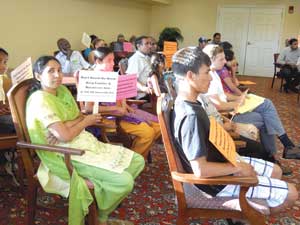
Community residents and business owners hoped to influence Planning Board policy at last Thursday’s meeting. - Photo by Ashley Taylor
Condos on Somerville Avenue, more time for IKEA
By Ashley Taylor
Last Thursday, Somerville’s Planning Board met for the fifteenth time to discuss landowner James Herbert’s request for a special permit to replace the three buildings he owns from 378-390 Broadway with a five-story condominium building. It was the first time the Board met to discuss a request by furniture giant IKEA to extend its special permit for a proposed retail outlet in Assembly Square. The five-member Board unanimously approved both proposals.
The smooth passage of the permits flew in the face of underlying controversies and complications of both agenda items.
Herbert’s new condominium would displace two businesses and tenants of 15 apartments. Many of the tenants have low incomes or are disabled and are worried about finding affordable alternate housing.
About 40 protesters attended the meeting and carried fluorescent signs. The protesters were affiliated with the affordable housing advocacy organization, Somerville Community Corporation (SCC). Their signs read: “Don’t Knock the Block! Keep Families and Businesses here in Somerville at 378-390 Somerville Ave.”
“The block” consists of three buildings on Somerville Avenue, all owned by Herbert, bordered to the east by the iconic Shepard Fairey mural and to the West by Market Basket. 388 and 390 Somerville Ave., the two houses closest to Market Basket, together contain 11 apartments.
378-384 Somerville Ave., a single wooden building painted blue with ornate white and red trim, is home to Well Foods, a Middle Eastern/Indian grocery, Himalayan Market, a shop specializing in Nepalese imports, and four apartments.
The historical façade that would be preserved in Herbert’s condominium plan is this; the east corner of the building is rounded, like a tower, while on the west end of the building, a triangular peak protrudes above the buildings flat roof. The effect makes the steeple seems out of place, as it is not centered, however with the eastward, rounded corner as your front view, the building makes more sense, as there is a twin peak on the Carlton Street face of the building.
What would not be preserved are the existing retail shops and four apartments at 378-384 Somerville Avenue or the other two apartment buildings on the block, all of which would be evicted under the current plan.
Well Foods owner Jahangir Kabir and his lawyer, Benjamin Tariri, who both attended Thursday’s meeting, claim that Well Foods has a lease on 380 Somerville Ave. until 2015. Herbert disagrees. Herbert’s lawyer, Richard DiGirolamo, Esq., said that the lease was terminated, he didn’t recall on what date, citing a failure by Kabir. DiGirolamo added that they view Well Foods as a tenant-at-will (that is, without a lease/month-to-month). Kabir and Tariri said they plan to file an injunction to prevent Herbert from moving forward.
Well Foods is not the only retailer that would be displaced by Herbert’s plans. Adjacent to Well Foods is Himalayan Market, a small shop brimming with Nepalese silk scarves, linen shirts, beaded purses, wooden elephant ornaments, and rugs, with some Boston and Harvard t-shirts thrown in. A sign in the window read: “Don’t trade us for condos.”
Under the Condo Conversion Ordinance in Somerville, City Planner George Proakis explained, tenants must receive one year’s notice of the landlord’s plans to convert from apartments to condos. Even though the apartments would be torn down and rebuilt, not converted, the City ruled that the Conversion Ordinance would apply. Herbert sent notices to tenants this February, Proakis said. Low-income, elderly, and disabled tenants have an additional year before they are required to move out, which could stall the project until February, 2013.
That means that if the two-year special permit becomes official following an appeals period, it would be valid only a few months after the last tenants are required to move out.
The tenants on the block, many of whom are low-income, disabled, or elderly, are worried about finding affordable places to move once their time is up. One idea people are batting around is that a non-profit organization could buy some of the condos and rent them out at affordable rates.
Herbert himself offered to sell the three properties and special permit to Somerville Community Corporation last year, said Mary Regan, a community organizer for SCC, however his asking price of $3.5 million was beyond SCC’s budget. She stated that as an alternative, SCC proposed buying only some of the condos and renting them at affordable rates, however Herbert, who plans to sell the entire block and the permit to a developer, was not interested in selling individual units.
DiGirolamo, when questioned about Regan’s story, said that SCC has never presented them a written offer to buy individual condo units.
Four of the 30 new condos (12.5 percent) will be sold at affordable rates, as required by law, and tenants will have first-refusal rights to the condos, said Proakis at Thursday’s meeting.
The other notable agenda item at the Planning Board meeting was IKEA’s request for a one-year extension to its special permit for a new store in Assembly Square. Their current permit was first approved in October 2007 and renewed in August 2009. The 2009 permit will expire this August. The Board approved the permit extension, and during the public hearing, everyone who spoke was in favor of the extension.
Two factors complicate IKEA’s special permit process, Doug Greenholz, Vice-President of Real Estate for IKEA in the USA, explained at Thursday’s meeting. First, in 2009, IKEA and Federal Realty Investment Trust, the Assembly Square developer, agreed to swap parcels, moving the future IKEA store inland from the waterfront. That land swap brought the IKEA project back to square one in the eyes of the company managers, who had approved the waterfront project way back in 2004. IKEA considers the inland store a new project and has not yet approved it, which is why IKEA cannot break ground on the new store, Greenholz said. And approval for the inland project may not be easy to obtain.
“While we in the US implement the plans, they are funded by our corporate group in Sweden and so there is a central pool of funds that gets allocated globally, and we compete for capital internally. And so this project is weighed against other opportunities,” Greenholz explained.
The other complicating factor is the Permit Extension Act of 2010, state legislation that granted a two-year extension to permits issued after August 2008. This act would have extended IKEA’s 2009 permit from August 2011 to August 2013. At the time, City planners were dismayed by this bill, because it would delay state funds for Assembly Square (Infrastructure Investment Incentive, or I-cubed) that were contingent on state tax revenues from the new IKEA. Yet in April, the state legislature passed an amendment that exempted I-cubed projects from the permit extension, a measure that would force IKEA to break ground in August 2011 or lose its permit.
On May 17, Greenholz said, the city notified IKEA that its project would be exempt from the automatic permit extension. While IKEA questions that exemption, the company decided to “remove the cloud over the expiration date,” as Greenholz said, and simply apply for a one-year permit extension, which the Planning Board granted. Four residents spoke in favor of the permit extension and no one spoke in opposition.
Greenholz also announced that IKEA has agreed to provide $100,000 for a jobs training program in Somerville.
Planning Board member James Kirylo asked if IKEA could predict when they would start building. “I wish I could tell you that,” Greenholz replied. Board Member Michael A. Capuano, Esq., commented, “I don’t mind one year, but my concern is that they are going to keep pushing and keep pushing.”















Reader Comments